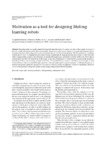Motivation as a Tool for Designing Lifelong Learning Robots

Use este enlace para citar
http://hdl.handle.net/2183/26627
Excepto si se señala otra cosa, la licencia del ítem se describe como This article is published online with Open Access and distributed under the terms of the Creative Commons Attribution Non-Commercial License (CC BY-NC 4.0)
Colecciones
- Investigación (EPEF) [590]
Metadatos
Mostrar el registro completo del ítemTítulo
Motivation as a Tool for Designing Lifelong Learning RobotsFecha
2020Cita bibliográfica
Romero, Alejandro et al. ‘Motivation as a Tool for Designing Lifelong Learning Robots’. 1 Jan. 2020 : 353 – 372.
Resumen
[Abstract] Designing robots has usually implied knowing beforehand the tasks to be carried out and in what domains. However, in the case of fully autonomous robots this is not possible. Autonomous robots need to operate in an open-ended manner, that is, deciding on the most interesting goals to achieve in domains that are not known at design time. This obviously poses a challenge from the point of view of designing the robot control structure. In particular, the main question that arises is how to endow the robot with a designer defined purpose and with means to translate that purpose into operational decisions without any knowledge of what situations the robot will find itself in. In this paper, we provide a formalization of motivation from an engineering perspective that allows for the structured design of purposeful robots. This formalization is based on a definition of the concepts of robot needs and drives, which are related through experience to the appropriate goals in specific domains. To illustrate the process, a motivational system to guide the operation of a real robot is constructed using this approach. A series of experiments carried out over it are discussed providing some insights on the design of purposeful motivated operation.
Palabras clave
Open-ended learning
Motivation
Lifelong learning
Autonomous robots
Motivation
Lifelong learning
Autonomous robots
Versión del editor
Derechos
This article is published online with Open Access and distributed under the terms of the Creative Commons Attribution Non-Commercial License (CC BY-NC 4.0)
ISSN
1875-8835






